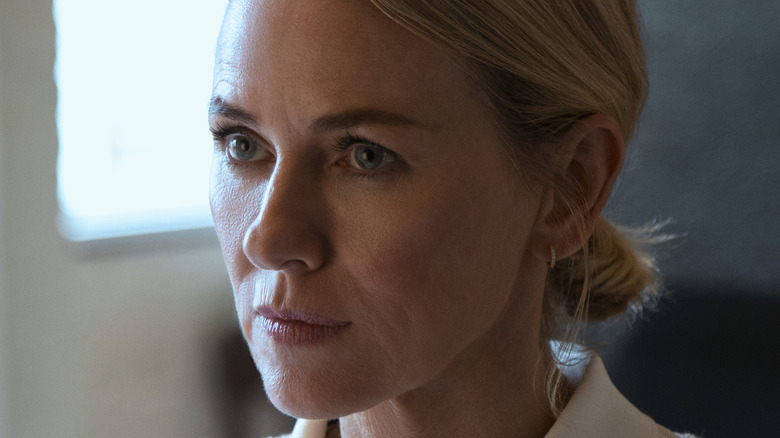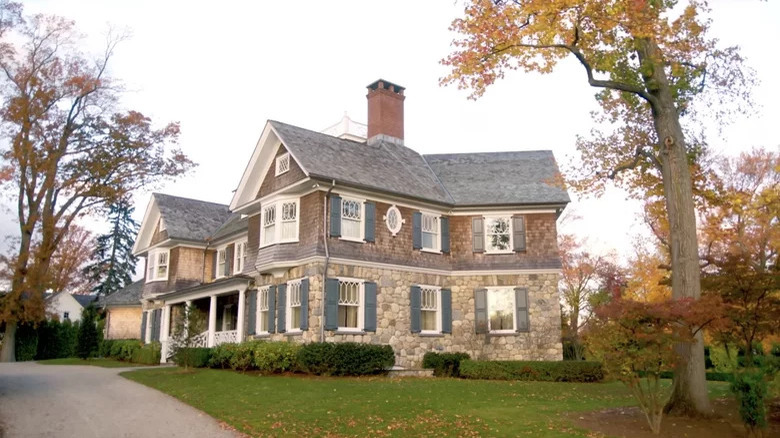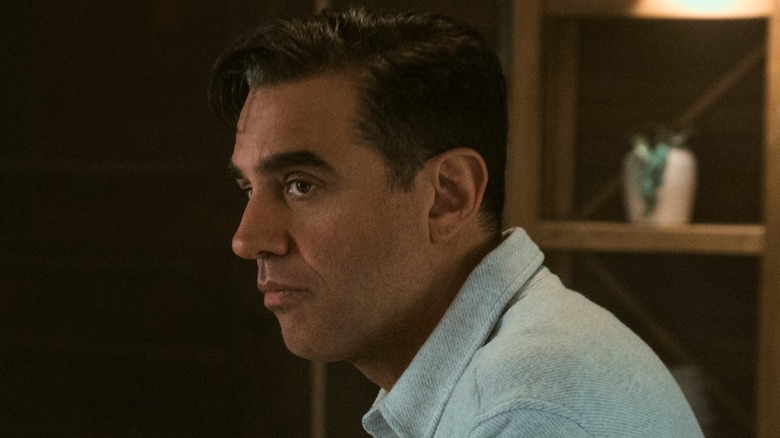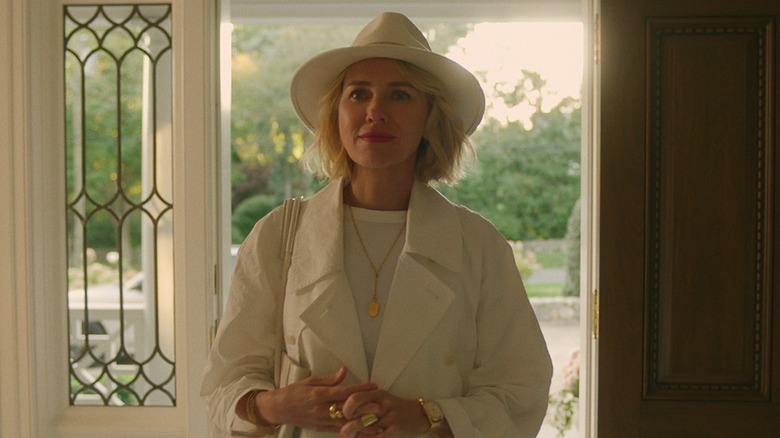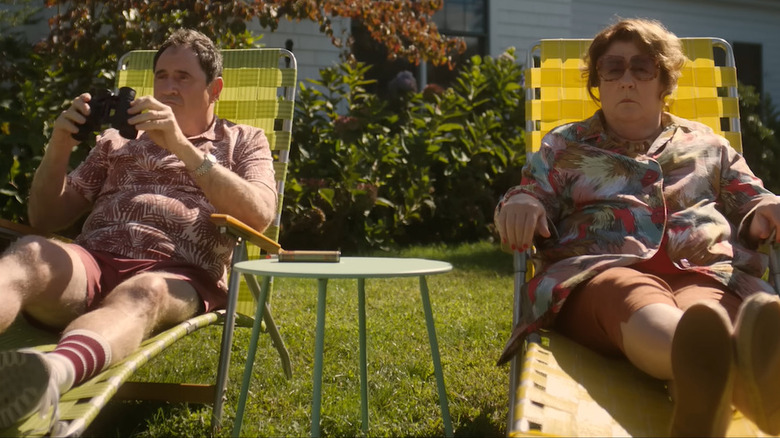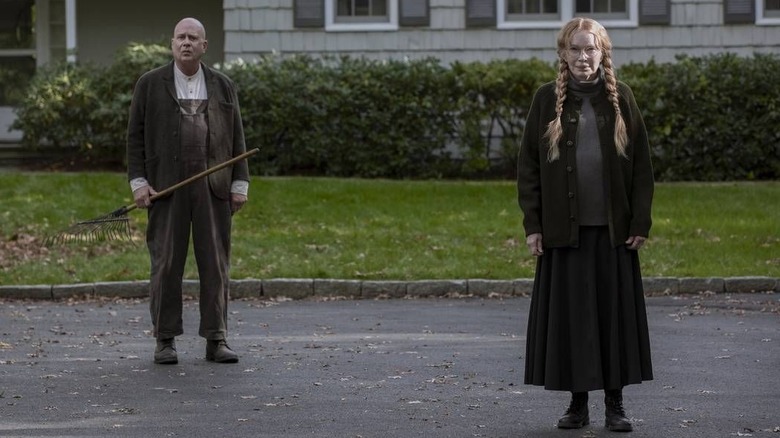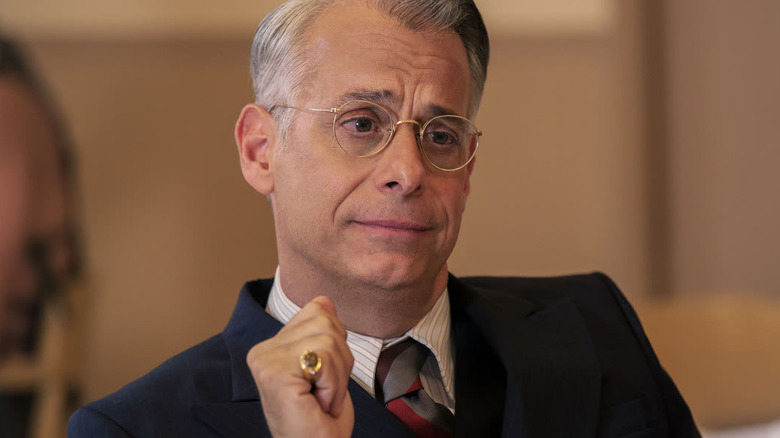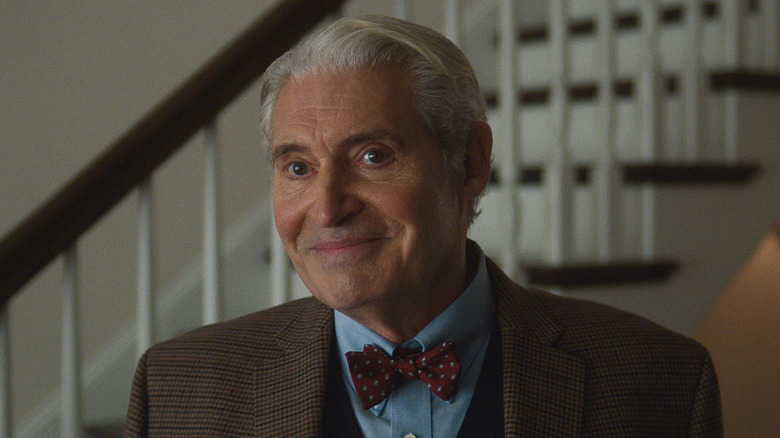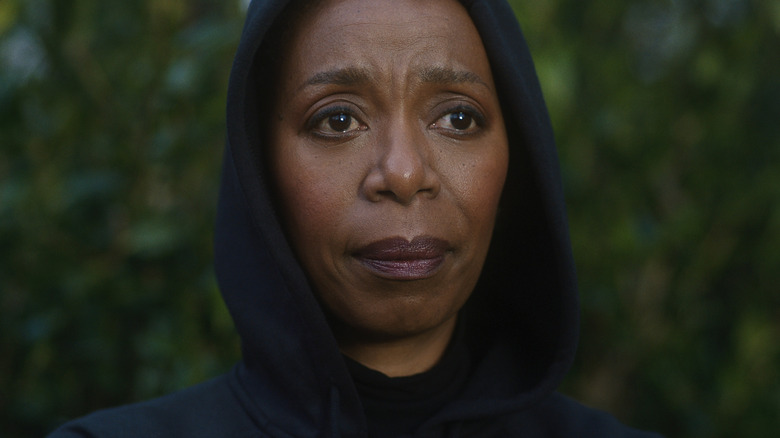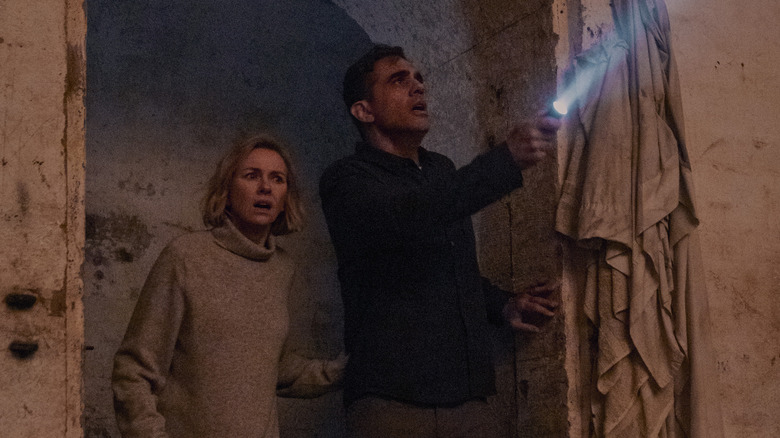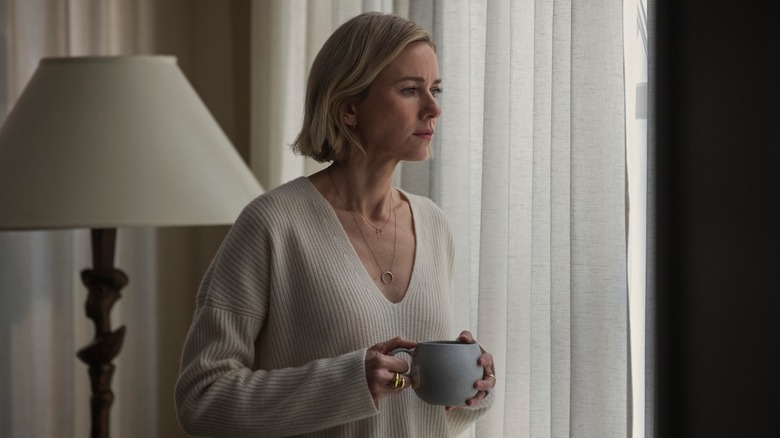The Ending Of The Watcher Season 1 Explained
Fragmentary and dreamlike, campy and unsettling, "The Watcher" is an exploration of suburban anomie that never quite gives you what you're looking for. But far from being a failure of the series, it's apparently intended. According to Sky News, the actors themselves were given only one script at a time so that not even they knew their characters' eventual destination, and it shows.
"The Watcher" is a great opportunity to watch Bobby Cannavale seethe, Naomi Watts cut a satisfied wry grin, Margo Martindale do her patented blend of folksy humor and chilling hostility, Mia Farrow having the time of her life as a kooky neighbor, and experience Jennifer Coolidge doing those specific things that only Jennifer Coolidge does. But it's not a mystery in the strictest sense — or at least, not the kind with a solution. Just like the case it's based on, there are no easy answers here.
In this recognizably suburban nightmare based on a 2018 story by Reeves Wiedeman, the families that live in a particular house receive decades' worth of troubling letters from someone known only as "The Watcher." The series follows one family in particular as it falls apart under the pressure.
657 Boulevard
In an era of Ring doorbells and CCTV cameras and Siri and Alexa, the idea that we're under almost constant surveillance is prime material for suspense, or even horror. "The Watcher" takes that one step further by giving this sense of being watched — something that we're all aware of, but only becomes troubling upon reflection — a physical form. The sometimes childlike, often poetic writing of the Watcher only contributes to its dreamy spookiness.
The story starts with a neighborhood and a house well above the Brannock family's station where they're being watched not only by their neighbors and social betters, but by a faceless spirit who is sometimes loving, and sometimes hateful and frightening. As the series continues from episode to episode, the list of suspects changes and mutates, each episode ending with a new potential culprit.
It's reminiscent of the original "Pretty Little Liars," which almost always ended episodes with a certainty that so-and-so was the villain, only to have that certainty blown away in the first minutes of the next episode. It's a powerful, smart setup that leads you on, making it utterly effective for a show constructed for a binge watch.
Dean Brannock
By the end of things, the Brannocks' marriage is in tatters, even if their relationship with their children seems mended. They are in a social free fall, and the financial power dynamic has flipped. From the first moment, so much of Dean's obsession with the house is about his need to prove himself as a provider — which is to say, as a man.
Dean's toxicity is broadcast early and often, with his obsessive focus on his daughter's teenage body and love life, as well as his tendency toward violence. It doesn't take terribly long for his façade to crumble and fall apart as the pressure of being under the Watcher's eye makes his self-consciousness even more undermining.
It's a kind of irony that Dean's issues with the relationship between daughter Ellie and her boyfriend Dakota is what results in the greatest shock to both Dean's professional life and their social life. She films a TikTok complaining that his aversion to their relationship is about race, which Dean and Nora protest — perhaps too much, frankly.
In the end, Dean has become a second Watcher, surveilling and perhaps even writing to the house's newest tenants. Despite Theodora and Nora's best efforts to help Dean get free, he is unable to pry his sense of self away from the house and we're left with the feeling that Dean is going to be consumed by the house just like the Watchers before him.
Nora Brannock
Nora Brannock is a social climber from the start, willing to take her orders from the bizarre but socially comfortable realtor Karen Calhoun when it comes to making her way in this new suburban paradise.
This proclivity is softened somewhat by the fact that her accomplishments as a ceramicist have made her a respected member of the art world. Some of the social intangibles she seeks aren't quite as intangible as they might be for someone in another line of work. Art is a world of access and connections, and that's all Nora's really looking for when they arrive in Westfield. By the end, of course, she's terrorizing her realtor by pretending to be the Watcher in her old house, but that's a long way from where she starts.
Nora ends the series on a high note — her gallery pieces are selling, she's been invited to multiple Art Basels, and she's supporting the family. While she gives credit to Dean for his visiting his counselor, she also doesn't trust him and follows him on his house-watching errands. Whatever the answers to the many mysteries they've uncovered, we know that she's at least willing to lie to him and definitely aware of her options.
Dakota and Ellie
Dakota ends the series by leaving his calling card in the mailbox of the new family living in the house, as if to signal that there is a cycle starting up again. While Dakota is acquitted of any wrongdoing — first by the statutory laws of New Jersey and then by his own dogged work — the circumstances leave us uneasy. In a story about total surveillance, Dakota is the living embodiment of the concept. Perhaps that's the meaning of his reappearance at the house in the series' final moments.
Ellie somehow manages to find peace with her parents after the struggle and terror of their situation calms down. She won't exactly take an active role in the family, but she seems to have proven something to Dean by the end. He spends much less time worrying about her love life than we see throughout the series, although he still hectors her about lipstick and bare shoulders. Nevertheless, it would be nice to think that Ellie is strengthened or emboldened in some way by the family's experiences.
Mitch and Mo
One of the show's most unbelievable twists involves Mitch and Mo, the Brannocks' neighbors across the street. They are apparently wheeled out of their house on gurneys, dead from a shotgun murder-suicide, only to miraculously reappear a few episodes later. As it turns out, they were merely on a vacation; the dead couple were actually a pair of unhoused people brought to the house and killed by Mo and Mitch's son Christopher.
Maureen, or "Big Mo," ends the series with a lot more dignity than we might expect. Mitch dies of an embolism offscreen; Christopher is locked up probably forever for his murders, and Mo herself is dying of cancer. But she is vindicated of any involvement with the Watcher or any of the other mysterious goings-on in the neighborhood.
One of the most compelling dangling threads is exactly what Christopher was thinking when he lured the couple to his parents' empty home and then staged their deaths. Maureen offers no real answers on this count and just seems exhausted by the whole thing in the end. Perhaps a life cut senselessly short by illness has prepared her for senselessness in other arenas.
Pearl and Jasper
Mia Farrow is a delight as always in "The Watcher." As her brother Jasper, Terry Kinney proves once again that he's earned his reputation as a staunch company player. They're not quite in the mix to the degree that you might assume throughout the season, but Pearl and Jasper seem to have something to do with the tunnel system and living space underground, as well as with the mysterious man known as William Webster.
Jasper ends the season chopping wood in a menacing way on the property, as if to create the necessary creepy ambience for the new family to understand what they've gotten themselves into. Presumably, he is also thinking about the dumbwaiter and how he would like to be in it.
However, Pearl ends the story as she began it — running the Westfield Preservation Society and working toward its ends, no matter the cost. Her obsession with architectural details and historical accuracy lends her the slightly unbelievable but well-acted air of a Myrtle Snow from Ryan Murphy's "American Horror Story: Coven."
Perhaps it's Pearl that makes the best case for a second season of "The Watcher," merely because she's such a joy to observe. Her strangeness, the clever dialogue she gets to deliver, and Farrow's clear enjoyment of the role all add up to something memorable.
The mysterious John or Bill or William
The newest member of the Westfield Preservation Society, and seemingly Pearl's henchman, is an enigma. First, he presents himself at the open house as "John" and discusses his daughter and a nearby church at length.
Then we learn of a man named John Graff who attended the same church, lived in the house and — with shades of "The Amityville Horror" — murdered his entire family, and with a shotgun, no less.
Dean is obsessed with the idea that his strange visitor John is actually John Graff hanging around the site of his massacre and possibly leaving little clues for Dean to find. This avenue of exploration is curtailed because by the end, John Graff — or, as he introduces himself, William "Bill" Webster — seems like one of the likeliest candidates for the Watcher himself.
He works with Pearl to scare the Brannocks away, sure, but he often just stands around the house with no sign of how he got there. For a series that takes its joy in the unraveling of its characters, we don't see much of his real motives or his real self, at all. He's a wildcard in a way the other suspects are not.
Andrew Pierce
Seth Gabel is one of Ryan Murphy's regular actors going back to the "Nip/Tuck" days, and it's easy to see why. Murphy's two favorite moods are "brittle weirdness" and "complete meltdown," and Gabel has a gift for both.
Gabel's character Andrew is an unreliable narrator who tells stories that make very little sense and conceals the fact that he's a professional actor, so Dean can be forgiven for mistrusting him. And while we get a momentary sense of relief when Theodora admits on her deathbed to manipulating Andrew, of course we're meant to understand that nothing Theodora says in that conversation is true.
We can assume that Andrew was driven somewhat mad by the house, and its Watcher, just as we see happen to Dean. Andrew is the only one who knows about the tunnels at first, and it's clear he has a troubled past with Mitch and Maureen. We end the season with Andrew sobbing and staring at the house, which doesn't seem like a great sign for his well-being.
But he isn't the Watcher, even if it seems this final tragic appearance outside the house might have greater meaning. Andrew is frustrating, because he believes in nonsense — the idea that Mitch and Mo are Satanic blood drinkers, for instance — but he is also willing to be more honest than some of the other characters are with Dean regarding his warped perceptions.
Karen Calhoun of Darren Dunn Realty
Jennifer Coolidge is, of course, a treasure. Karen is one of her most interesting roles to date, reclaiming and building on the complexity Coolidge showed in Season 1 of "White Lotus," which felt like the first time anybody gave her a role this meaty. Karen Calhoun is a real estate agent in the grandest sense, always working up deals and looking for angles. In fact, if Coolidge wasn't available, we could see Murphy regular Leslie Grossman sinking her teeth into this role.
While Karen's storyline gets a bit mangled by the end, her arc is easy to read: She starts off mercenary but kind, tries everything she can to get Nora to behave herself socially, and mostly seems to be along for the ride. But in the end, she's so twisted up by her dealings with the rapidly deteriorating Brannocks that she becomes sort of dazzlingly horrible when she buys the house herself and finds it just as haunted as everyone else who moves in.
Karen's an interesting case because by the end, we can see the whole story from her perspective. She has every right to be exasperated and done with the whole family, and angry with Nora specifically. Of course, being right will not save you and when we last see her, Karen is running down Boulevard in her dressing gown, screaming.
Roger Kaplan
As played by Michael Nouri, Roger is the inspiration for the Watcher in many ways, and just as creepy as he seems. For starters, his wife was a high school student of his, and he has a hair-trigger anger problem. But is he the Watcher? The jury says no. He's an unbalanced groomer, but his association with the house is purely as an admirer.
Again and again, from literally the first scene of the show, we see people dazzled and overwhelmed by the house's beauty. There is something transcendent about the house itself that we cannot see, but it controls everyone who comes across it.
Roger Kaplan is the best example, because he literally created his approach to teaching around his love of houses — he is famous for his lesson in which his students write "love letters" to a house somewhere in town. The Watcher takes this on as a sacred duty, in their own way, and in the end it's just a funny complication that Roger remains as enamored with the house as anyone else.
Theodora Birch
The marvelous Theodora Birch, played by Noma Dumezweni, turns the season finale inside out with her admission that she is a previous owner of the house and that she has orchestrated the entire Watcher horror story to get it back, including paying off "John Graff" and "Pigtails" and manipulating the psychologically fragile Andrew Pierce.
This is quite a shock, as Theodora is professionally connected professionally with Detective Chamberland. Part of Dean's theory is that the cops are in on the conspiracy, covering up murders and worse. Of course, these scenarios are unlikely, and the Watcher could be someone we don't even meet over the course of the series. After she passes away, it's revealed that Theodora apparently made up her story about being the Watcher.
Theodora pretends to be the Watcher to give Dean and herself some kind of closure. For herself, she needs it because she wants to solve this last case before she dies. For Dean, she sees the darkness and the obsession in him as it grows in a way that Nora doesn't. Perhaps it's Theodora's own history with addiction that gives her such insight into the other characters. Whatever the reason, she's good at her job and she provides plenty of useful intel throughout the season. She'll be missed in a hypothetical Season 2.
Questions
Why does John Graff, aka Bill Webster, keep showing up in the kitchen and upstairs? How does he get around all the time? Did he live down in the tunnels at any point? Did he really kill his family? Where did Pigtails, the ghostly presence who crawls into bed with Dean, come from?
And why would any family, upon discovering a network of open tunnels beneath their house, leave them there for even a moment longer than necessary? Wouldn't you seal them off, or at least do some serious investigating into their origins?
Of all the weird moments and funny absurdities of the story, the fact that everybody just seems to be okay with hidden passageways is a classic Ryan Murphy conceit. Of course, if they block off the tunnels, that eliminates most of the Watcher candidates since Pearl, Jasper, and Bill are the ones using the tunnels.
The Watcher
And there you have it — your explanation such as it is for the ending of "The Watcher," Season 1. The identity of the Watcher remains a mystery, but whoever it is continues to haunt the property and may have competition.
What would you do if you were being watched? The show seems to suggest that you would lose your entire mind, and maybe that's true. But the Watcher represents more than just that passive act of watching — he or she is of a piece with the restricted country clubs and declined invitations of suburbia where it seems we are all always already being watched. This makes it harder to seriously wonder about what we, the viewers, might do if we ended up in the same circumstances as the Brannocks. The show essentially presents a situation of uncomfortable horror and says there is no chance of escape, then spends seven episodes proving it.
Maybe the act of being Watched is itself some kind of crucible, a test of character, in which some of us might well be proven to be of sterner stuff; we just happen to be watching the story of one family that couldn't handle it at all.
